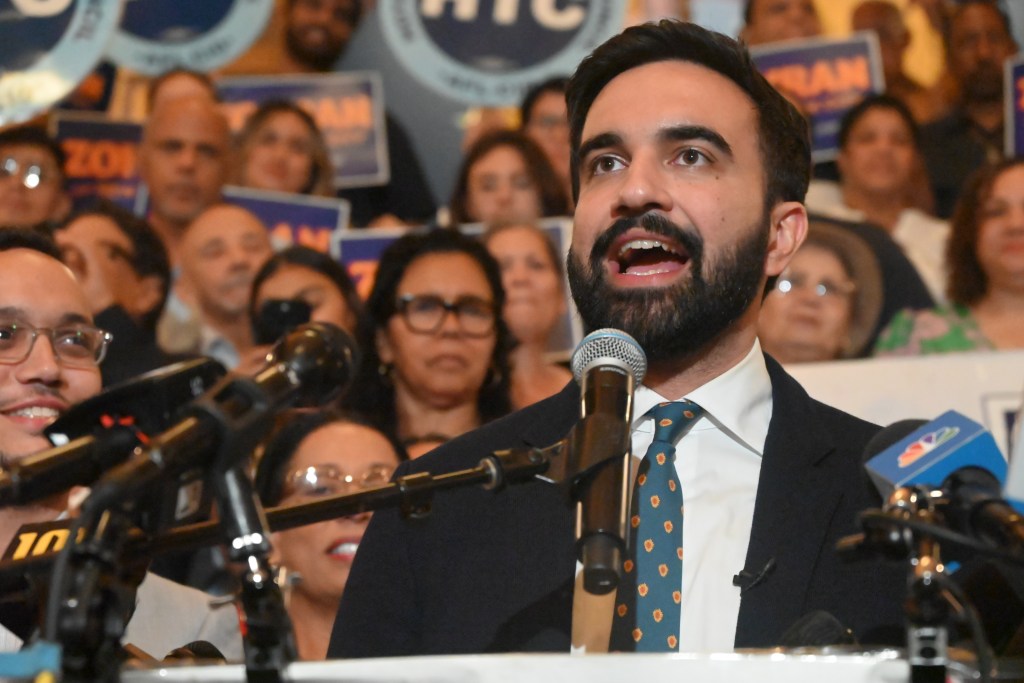
New York professionals staring down the possibility of Zohran Mamdani as the city’s next mayor are caught somewhere between hopeful and terrified as they contemplate life under an avowed socialist who wants to raise taxes, expand government and deprioritize policing.
“Hopeful,” explained Bradley Tusk, an independent political operative and government affairs executive in New York, “because a lot of people do think that there’s a chance he won’t be a disaster, that he’ll hire well, that he will have different views than them but he will be pragmatic. Also, keep in mind, the bar after the last two mayors is pretty low.” That would be Democrat Bill de Blasio and the incumbent mayor, Democrat-turned-independent Eric Adams.
“Terrified,” Tusk added, because they fear Mamdani’s agenda would damage New York’s economy, lead to a crime wave, and generally undermine the quality of life across the city’s five boroughs. For some Jewish professionals, those fears are more acute. Mamdani’s recent refusal to condemn the phrase “globalize the intifada” and his refusal to support Israel’s right to exist as a Jewish state is fueling their anxiety.
The 33-year-old state assemblyman has somewhat distanced himself from the phrase “globalize the intifada” since winning the Democratic nomination for mayor in June, although his position on Israel is unchanged. And amid a rash of antisemitic violence across the country, many New York Jews worry the city would be unsafe for their families under his administration. That’s why Republican donor Eric Levine is hosting an August 13 fundraiser for Adams, a decided underdog in this November’s general election.
“The discussions regarding Mamdani range from outright fear and hysteria to utter disgust. The consensus is, he is a communist and he is a Jew-hater,” said Levine, an attorney in New York and Republican Jewish Coalition board member. “People are just beside themselves and can’t understand how this is happening.” Levine’s fundraiser has 32 named co-hosts representing a range of New York professionals, according to a copy of the invitation obtained by The Dispatch. Among them is former New York Gov. David Paterson, a Democrat.
The November ballot also features Republican nominee Curtis Sliwa, independent Jim Walden, and Democratic former New York Gov. Andrew Cuomo. Cuomo lost his bid for the Democratic nomination in last month’s primary but previously secured a general election ballot line and is staying in the race as an independent candidate. In one recent poll, Mamdani led the field, garnering 39 percent, followed by Cuomo (21 percent) Sliwa (18 percent), and Adams (9 percent).
An earlier survey found a tighter contest, with Mamdani at 26 percent, Cuomo at 23 percent, Sliwa at 22 percent, and Adams at 13 percent, with 15 percent undecided.
Polls are not static. After all, Cuomo was the heavy favorite to win the Democratic nod up until the day of the primary. Mamdani ultimately won without the extra support from the ranked-choice voting process to secure his first-place finish. But five weeks after emerging as the favorite to serve as New York’s 111th mayor and becoming more well-known, Mamdani’s policy platform and provocative rhetoric about Israel aren’t exactly sinking his general election prospects.
Indeed, New York Democrats appear thrilled with his nomination and are copacetic with his criticism of Israel, Semafor’s David Weigel reported Tuesday.
What accounts for Mamdani’s strong political standing? Political observers should not discount the attractiveness of his main message—a pledge to make New York a more affordable city to live in. Voter angst about the rising cost of housing is a major political issue nationwide. In New Jersey and Virginia, home of two closely watched gubernatorial elections also on this fall’s ballot, candidates are similarly focused on affordability.
But perhaps some New York voters are less concerned about Mandani’s bold, socialist agenda because they’re counting on the fact that he can’t govern by fiat.
The New York City Council has a say in proposals for “free” bus service and childcare, city-owned grocery stores, a $30 minimum wage by 2030, a rent freeze in rent-stabilized apartments, and plans to establish a “Department of Community Safety” employing mental health professionals and “transit ambassadors” in lieu of more police hires. (Five years ago, Mamdani advocated defunding the police, a position he’s since dropped.)
Meanwhile, there’s a second obstacle blocking his plans.
Mamdani would pay for the free stuff he’s offering by taxing the so-called rich. But under state law, New York City cannot raise the city income tax without Albany signing off, and Gov. Kathy Hochul, a Democrat up for reelection in 2026, is promising to oppose tax hikes on Big Apple residents regardless of how much money they earn. Her stance is partly a product of not wanting mobile, wealthy professionals to abandon the city for lower tax climes.
It’s a commitment the Hochul administration highlighted Monday, responding to an inquiry from The Dispatch by pointing to the governor’s remarks during a late June news conference. “I have said that I will not raise income taxes on the people of our state. I’m focused on affordability, and raising taxes on anyone does not accomplish that. I’m just making sure that people who create jobs will stay here so we can have good-paying jobs,” Hochul said.
The Mamdani campaign did not respond to an email requesting comment.

















